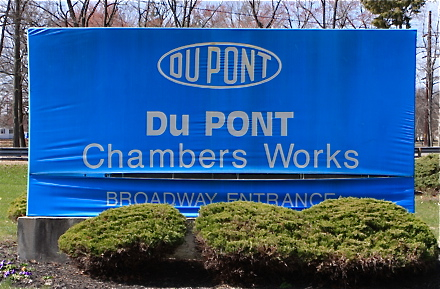Dupont Engaged in “Torture” of Whistleblower
Dupont’s Deadly Phosgene Gas Unit Another Potential Bhopal
NJ Supreme Court Finds Dupont Illegally Retaliated
“Responsible Care” (R) Exposed

I’ve been meaning to write about this case for months now.
Glowing exaggerated national press reports of a recent minor DEP enforcement action at the Dupont Chambers Works south jersey facility [and the upcoming RCRA permit hearing] now prompt me to get around to doing so.
Another recent development is relevant as well.
Despite Dupont’s recent announcement to phase out its commercial wastewater treatment at the plant, some NJ legislators are seeking to send fracking wastewater there, perhaps in an effort to revitalize Dupont’s bottom line there.
So here is the egregious whistleblower torture story.
Echoing the worst excesses of the Soviet Gulag, the NJ Supreme Court recently found that the Dupont Corporation engaged in illegal retaliation against a whistleblower.
The Dupont conduct and retaliation were so severe and intolerable – including pretextual mental health evaluations (redolent of the Gulag) and mandated 12 hour shifts in isolation (comparable to the treatment of Wikileaks source Bradley Manning) – the Supreme Court’s opinion discussed the whistleblower’s mental illness in the context of “torture”.
Here is what the whistleblower was concerned about:
In October 2003, Seddon filed complaints with DuPont’s management about unsafe conditions in the operation of the phosgene reactor. Seddon warned that deficiencies in the operation of the reactor could cause an explosion and the release of deadly gasses into the atmosphere, killing and seriously injuring nearby residents. Seddon compared the safety violations relating to the phosgene reactor to those that led to the infamous chemical disaster in Bhopal, India.5
Dupont suspended Seddon for 53 day and made his life hell in retaliation. Here is what the Supreme Court found:
Although DuPont’s investigators questioned Seddon about his safety complaints and the ensuing harassment, their attention focused on allegations that Seddon had threatened DuPont employees, including Kaiser — allegations that Seddon categorically denied. In April 2004, based on a recommendation by DuPont’s employee-assistance counselor, Seddon was placed on short-term disability with pay. During that time, Seddon lost the considerable overtime that he had been earning. As a condition of his reinstatement, DuPont required that Seddon be examined by three mental-health experts and undergo a fit-for- duty evaluation. Three independent evaluators, a psychiatrist and two psychologists, examined Seddon and cleared him to return to work. Significantly, one of the mental-health experts experts diagnosed Seddon as exhibiting “features of significant dysphoria and vulnerability to depression”
In September 2006, DuPont required Seddon to work twelve- hour shifts in isolation. For Seddon, working a twelve-hour shift alone was “torture”. One month later, Seddon began seeing a therapist and psychiatrist.
…
What constitutes an “adverse employment action” must be viewed in light of the broad remedial purpose of CEPA, and our charge to liberally construe the statute to deter workplace reprisals against an employee speaking out against a company’s illicit or unethical activities. Cast in that light, an “adverse employment action” is taken against an employee engaged in protected activity when an employer targets him for reprisals — making false accusations of misconduct, giving negative performance reviews, issuing an unwarranted suspension, and requiring pre textual mental-health evaluations –- causing the employee to suffer a mental breakdown and rendering him unfit for continued employment. See N.J.S.A. 34:19-2(e).
So, looks like our friends at Dupont are just holding up that voluntary chemical industry corporate standard of “Responsible Care”(R)
No need to fear them and no need for government regulation! [Update: even DEP sees this essentially only as a matter of implementation of Dupont’s corporate policy, not regulatory mandates to protect the public interest:
DuPont needs to apply its corporate vision of sustainability and environmental stewardship to its day-to-day operations at the Chambers Works facility, which means making the necessary investments in equipment and personnel that are critical to protection of the environment, public health and the health of workers,” said Wolf Skacel, Assistant Commissioner for Compliance and Enforcement.
Read the NJ Supreme Court’s decision on the case here
Read an independent lawyer’s summary here. [Sorry, this link is subscription only. Contact me for SHRM article by Connecticut lawyer Diane Cadrain. Here is Cadrain’s conclusion:
The high court held that CEPA covers not only discharge or suspension, but also other adverse employment actions affecting the terms and conditions of employment and that the remedies available included all proximately caused harm, including economic losses. It pointed out that the jury had decided that DuPont retaliated against Seddon because he expressed legitimate safety concerns about the operation of the phosgene reactor, that DuPont’s retaliatory action caused Seddon’s mental injury, that Seddon’s mental injury disabled him from working, and that his inability to work resulted in his lost wages. The court reversed the appellate decision and reinstated the jury’s award, holding that the jury had the power to award pay for lost wages because it found that DuPont’s retaliation made Seddon unable to work.
Donelson v. DuPont Chambers Works, N.J., No. 065628 (June 9, 2011).]
Hear, hear, Wolfe! ~~~Witz~~~